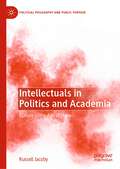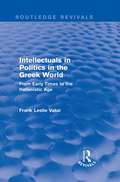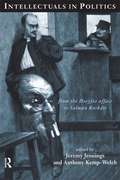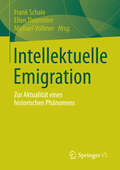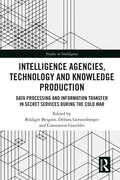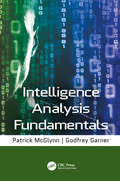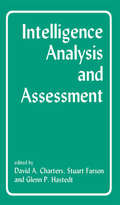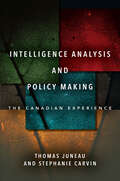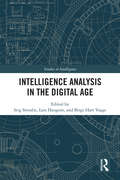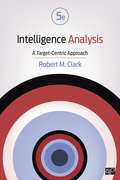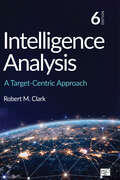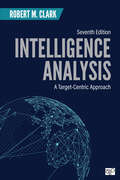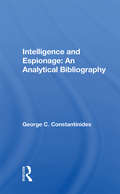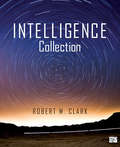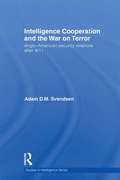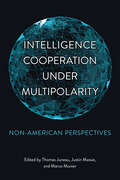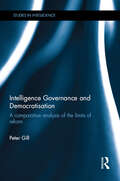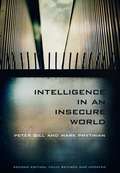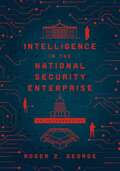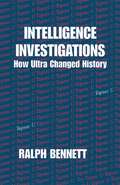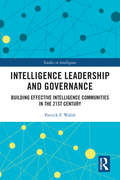- Table View
- List View
Intellectuals and the Search for National Identity in Twentieth-Century Brazil
by Ronald H. ChilcoteThis book discusses twentieth-century Brazilian political thought, arguing that while Rio de Janeiro intellectuals envisaged the state and the national bourgeoisie as the means to overcome dependency on foreign ideas and culture, São Paulo intellectuals looked to civil society and the establishment of new academic institutions in the search for national identity. Ronald H. Chilcote begins his study by outlining Brazilian intellectuals' attempt to transcend a sense of inferiority emanating from Brazilian colonialism and backwardness. Next, he traces the struggle for national identity in Rio de Janeiro through an account of how intellectuals of varying political persuasions united in search of a political ideology of national development. He then presents an analysis by São Paulo intellectuals on racial discrimination, social inequality, and class differentiation under early capitalism and industrialization. Lastly, the book concludes with a discussion on how Brazilian intellectuals challenged foreign thinking about development through the state and representative democratic institutions, in contrast to popular and participatory democratic practices.
Intellectuals in Politics and Academia: Culture in the Age of Hype (Political Philosophy and Public Purpose)
by Russell JacobyThis book addresses the fate of intellectuals in modern culture and politics. Russell Jacoby’s seminal The Last Intellectuals: American Culture in the Age of Academe (1987, 2000) introduced the term “public intellectual” and gave rise to heated controversy. Here Jacoby assesses contemporary public intellectuals, their profound failings and limited achievements. The book includes biting appraisals of well-known intellectuals, such as Noam Chomsky, Hannah Arendt, and Bernard-Henri Lévy, as well as interventions on violence, utopia and multiculturalism.
Intellectuals in Politics in the Greek World: From Early Times to the Hellenistic Age (Routledge Revivals)
by Frank VataiIntellectuals in Politics in the Greek World, first published in 1984, was the first comprehensive study of this recurrent theme in political sociology with specific reference to antiquity, and led to significant revaluation of the role of intellectuals in everyday political life. The term ‘intellectual’ is carefully defined, and figures as diverse as Pythagoras, Plato and Aristotle; Isocrates, Heracleides of Ponteius and Clearchus of Soli are discussed. The author examines the difference between the success of an intellectual politician, like Solon, and the failure of those such as Plato who attempted to mould society to abstract ideals. It is concluded that, ultimately, most philosophers were conspicuously unsuccessful when they intervened in politics: citizens regarded them as propagandists for their rulers, while rulers treated them as intellectual ornaments. The result was that many thinkers retreated to inter-scholastic disputation where the political objects of discussion increasingly became far removed from contemporary reality.
Intellectuals in Politics: From the Dreyfus Affair to Salman Rushdie
by Jeremy Jennings Anthony Kemp-WelchAfter an introduction to the major issues confronting intellectuals, this book explores the various aspects of the intellectual's role including:* philosophers and academics who have tried to define the function of the intellectual* how intellectuals have assumed the status of the conscience of the nation and the voice of the oppressed* the interaction of intellectuals with Marxism* the place of the intellectual in American societyCovering regions as diverse as Israel, Algeria, Britain, Ireland, central Europe and America, this collection considers the question of whether the intellectual can still lay claim to the language of truth. In answering, this study tells us much about the modern world in which we live.Coverage includes the following thinkers: Gramsci, Weber, Yeats, Auden, Levy, Mailer, Walzer, Marx and many more.
Intellektuelle Emigration
by Frank Schale Michael Vollmer Ellen ThümmlerEine Intellektuellengeschichte des 20. Jahrhunderts muss die geistigen Einflüsse deutscher Wissenschaftsemigranten zwischen 1933 und 1945 berücksichtigen. Zu einschneidend prägte sie das literarische, kulturelle und politische Denken diesseits und jenseits des Atlantiks. Aus einem breiten Verständnis von Ideengeschichte heraus werden nicht nur prominente Emigranten wie Hannah Arendt, Arnold Bergstraesser und Franz L. Neumann, sondern zugleich dem drohenden Vergessen anheim fallende Flüchtlinge wie Sigmund Neumann, Ferdinand Hermens und Otto Neurath oder bisher kaum beachtete Biographien von André Gorz und Romain Rolland vorgestellt. Einerseits rekonstruieren die Beiträge die dramatischen Lebenslinien sowie die oft unter beklemmenden Bedingungen angefertigten politischen, gesellschafts-, kultur- und wissenschaftstheoretischen Arbeiten. Andererseits wagen sie auch einen Blick auf die Perspektiven der Emigrationsforschung heute.
Intelligence Agencies, Technology and Knowledge Production: Data Processing and Information Transfer in Secret Services during the Cold War (Studies in Intelligence)
by Constantin Goschler Rüdiger Bergien Debora GerstenbergerThis volume examines intelligence services since 1945 in their role as knowledge producers. Intelligence agencies are producers and providers of arcane information. However, little is known about the social, cultural and material dimensions of their knowledge production, processing and distribution. This volume starts from the assumption that during the Cold War, these core activities of information services underwent decisive changes, of which scientization and computerisation are essential. With a focus on the emerging alliances between intelligence agencies, science and (computer) technology, the chapters empirically explore these transformations and are characterised by innovative combinations of intelligence history with theoretical considerations from the history of science and technology and the history of knowledge. At the same time, the book challenges the bipolarity of Cold War history in general and of intelligence history in particular in favour of comparative and transnational perspectives. The focus is not only the Soviet Union and the United States, but also Poland, Turkey, the two German states and Brazil. This approach reveals surprising commonalities across systems: time and again, the expansion and use of intelligence knowledge came up against the limits that resulted from intelligence culture itself. The book enriches our global understanding of knowledge of the state and contributes to a historical framework for the past decade of debates about the societal consequences of intelligence data processing. This book will be of much interest to students of intelligence studies, science and technology studies, security studies and International Relations.
Intelligence Analysis Fundamentals
by Godfrey Garner Patrick McGlynnThere are a limited number of intelligence analysis books available on the market. Intelligence Analysis Fundamentals is an introductory, accessible text for college level undergraduate and graduate level courses. While the principles outlined in the book largely follow military intelligence terminology and practice, concepts are presented to correlate with intelligence gathering and analysis performed in law enforcement, homeland security, and corporate and business security roles. Most of the existing texts on intelligence gathering and analysis focus on specific types of intelligence such as ‘target centric’ intelligence, and many of these, detail information from a position of prior knowledge. In other words, they are most valuable to the consumer who has a working-level knowledge of the subject. The book is general enough in nature that a lay student—interested in pursuing a career in intelligence, Homeland Security, or other related areas of law enforcement—will benefit from it. No prior knowledge of intelligence analysis, functions, or operations is assumed. Chapters illustrate methods and techniques that, over the years, have consistently demonstrate results, superior to those achieved with other means. Chapters describe such analytical methods that are most widely used in the intelligence community and serve as recognized standards and benchmarks in the practice of intelligence analysis. All techniques have been selected for inclusion for their specific application to homeland security, criminal investigations, and intelligence operations. Uses numerous hands-on activities—that can easily be modified by instructors to be more or less challenging depending on the course level—to reinforce concepts As current and active members of the intelligence community, the authors draw on their decades of experience in intelligence to offer real-world examples to illustrate concepts All methodologies reflect the latest trends in the intelligence communities assessment, analysis, and reporting processes with all presented being open source, non-classified information As such, the non-sensitive information presented is appropriate—and methods applicable—for use for education and training overseas and internationally Military-style collection and analysis methods are the primary ones presented, but all are directly correlated intelligence to current concepts, functions and practices within Homeland Security and the law communities Covers the counterterrorism environment where joint operations and investigative efforts combine military, private sector, and law enforcement action and information sharing The book will be a welcome addition to the body of literature available and a widely used reference for professionals and students alike.
Intelligence Analysis and Assessment (Studies in Intelligence)
by David A. Charters Glenn P. Hastedt A. Stuart FarsonThese essays cover: assessment systems now in place in Britain, the USA, Germany and Australia; the bureaucratic dynamics of analysis and assessment; the changing ground in intelligence; and the impact of new technologies and modes of communication on intelligence gathering and analysis.
Intelligence Analysis and Policy Making: The Canadian Experience
by Stephanie Carvin Thomas JuneauCanada is a key member of the world's most important international intelligence-sharing partnership, the Five Eyes, along with the US, the UK, New Zealand, and Australia. Until now, few scholars have looked beyond the US to study how effectively intelligence analysts support policy makers, who rely on timely, forward-thinking insights to shape high-level foreign, national security, and defense policy. Intelligence Analysis and Policy Making provides the first in-depth look at the relationship between intelligence and policy in Canada. Thomas Juneau and Stephanie Carvin, both former analysts in the Canadian national security sector, conducted seventy in-depth interviews with serving and retired policy and intelligence practitioners, at a time when Canada's intelligence community underwent sweeping institutional changes. Juneau and Carvin provide critical recommendations for improving intelligence performance in supporting policy—with implications for other countries that, like Canada, are not superpowers but small or mid-sized countries in need of intelligence that supports their unique interests.
Intelligence Analysis in the Digital Age (Studies in Intelligence)
by Stig Stenslie; Lars Haugom; Brigt Harr VaageThis book examines intelligence analysis in the digital age and demonstrates how intelligence has entered a new era. While intelligence is an ancient activity, the digital age is a relatively new phenomenon. This volume uses the concept of the "digital age" to highlight the increased change, complexity, and pace of information that is now circulated, as new technology has reduced the time it takes to spread news to almost nothing. These factors mean that decision-makers face an increasingly challenging threat environment, which in turn increases the demand for timely, relevant, and reliable intelligence to support policymaking. In this context, the book demonstrates that intelligence places greater demands on analysis work, as the traditional intelligence cycle is no longer adequate as a process description. In the digital age, it is not enough to accumulate as much information as possible to gain a better understanding of the world. To meet customers’ needs, the intelligence process must be centred around the analysis work – which in turn has increased the demand for analysts. Assessments, not least predictions, are now just as important as revealing someone else’s secrets. This volume will be of much interest to students of intelligence studies, security studies, and international relations.
Intelligence Analysis: A Target-Centric Approach
by Robert M. ClarkRobert M. Clark’s Intelligence Analysis: A Target-Centric Approach demonstrates that a collaborative, target-centric approach leads to sharper and more effective analysis, while better meeting the needs of the customer. Thoroughly revised to reflect the changes in the constantly shifting landscape of intelligence, the Fifth Edition contains a new chapter that frames the nature of intelligence in 21st century conflict. The book also accounts for recent events such as the rise of ISIL and the conflict in Ukraine, and contains new examples throughout. Clark’s practical information and insider perspective create the perfect resource for students and practitioners alike.
Intelligence Analysis: A Target-Centric Approach
by Robert M. ClarkRobert M. Clark’s Intelligence Analysis: A Target-Centric Approach demonstrates that a collaborative, target-centric approach leads to sharper and more effective analysis, while better meeting the needs of the customer. Thoroughly revised to reflect the changes in the constantly shifting landscape of intelligence, the Fifth Edition contains a new chapter that frames the nature of intelligence in 21st century conflict. The book also accounts for recent events such as the rise of ISIL and the conflict in Ukraine, and contains new examples throughout. Clark’s practical information and insider perspective create the perfect resource for students and practitioners alike.
Intelligence Analysis: A Target-Centric Approach
by Robert M. ClarkNow in its Sixth Edition, Robert M. Clark's Intelligence Analysis: A Target-Centric Approach once again delivers a consistent, clear method for teaching intelligence analysis—demonstrating how a collaborative, target-centric approach leads to sharper and more effective analysis. This bestseller also includes new end-of-chapter questions to spark classroom discussion, as well as material on the intelligence cycle, collection, managing analysis, and dealing with intelligence customers. Clark’s practical approach combined with his insider perspective create the ideal resource for students and practitioners alike.
Intelligence Analysis: A Target-Centric Approach
by Robert M. ClarkNow in its Sixth Edition, Robert M. Clark's Intelligence Analysis: A Target-Centric Approach once again delivers a consistent, clear method for teaching intelligence analysis—demonstrating how a collaborative, target-centric approach leads to sharper and more effective analysis. This bestseller also includes new end-of-chapter questions to spark classroom discussion, as well as material on the intelligence cycle, collection, managing analysis, and dealing with intelligence customers. Clark’s practical approach combined with his insider perspective create the ideal resource for students and practitioners alike.
Intelligence Analysis: A Target-Centric Approach
by Robert M. ClarkNow in its Seventh Edition, Robert M. Clark′s Intelligence Analysis: A Target-Centric Approach once again delivers a consistent, clear method for teaching intelligence analysis, demonstrating how a collaborative, target-centric approach leads to sharper and more effective analysis. In addition to looking at the intelligence cycle, collection, managing analysis, and dealing with intelligence customers, the author also examines key advances and emerging fields like prescriptive intelligence. Through features like end-of-chapter questions to spark classroom discussion, this text combines a practical approach to modeling with an insider perspective to serve as an ideal and insightful resource for students as well as practitioners.
Intelligence Analysis: A Target-Centric Approach
by Robert M. ClarkNow in its Seventh Edition, Robert M. Clark′s Intelligence Analysis: A Target-Centric Approach once again delivers a consistent, clear method for teaching intelligence analysis, demonstrating how a collaborative, target-centric approach leads to sharper and more effective analysis. In addition to looking at the intelligence cycle, collection, managing analysis, and dealing with intelligence customers, the author also examines key advances and emerging fields like prescriptive intelligence. Through features like end-of-chapter questions to spark classroom discussion, this text combines a practical approach to modeling with an insider perspective to serve as an ideal and insightful resource for students as well as practitioners.
Intelligence And Espionage: An Analytical Bibliography
by George C ConstantinidesThis pioneering work, based on many years of reading and research and ranging mainly from the seventeenth century to the present, breaks new ground in intelligence bibliography. It is the most comprehensive and thorough bibliography of English-language nonfiction books on intelligence and espionage to date. The in-depth analytical annotations deal
Intelligence Collection
by Robert M. ClarkThis comprehensive book by one of the foremost authorities in the field offers systematic and analytical coverage of the "how and why" of intelligence collection across its three major stages—the front end (planning), collection, and the back end (processing, exploitation, and dissemination). The book provides a fresh, logical, and easily understandable view of complex collection systems used worldwide. Its ground-breaking organizational approach facilitates understanding and cross-INT collaboration, highlighting the similarities and differences among the collection INTs. The first part of the book explains how the literal INTs—open source, human intelligence, communications intelligence, and cyber collection—work. The second part focuses on nonliteral or technical INTs including imagery, electronic intelligence, and measurements and signatures intelligence. All chapters use a common format based on systems analysis methodology, detailing function, process, and structure of the collection disciplines. The third part is a complete chapter discussing the complexities of collection management in the United States. Rich, full color illustrations accompany the text with examples throughout the book on topics as diverse as battlespace situational awareness, terrorism, weapons proliferation, criminal networks, treaty monitoring, and identity intelligence.
Intelligence Cooperation and the War on Terror: Anglo-American Security Relations after 9/11 (Studies in Intelligence)
by Adam D.M. SvendsenThis book provides an in-depth analysis of UK-US intelligence cooperation in the post-9/11 world. Seeking to connect an analysis of intelligence liaison with the wider realm of Anglo-American Relations, the book draws on a wide range of interviews and consultations with key actors in both countries. The book is centred around two critical and empirical case studies, focusing on the interactions on the key issues of counterterrorism and weapons of mass destruction (WMD) counter-proliferation. These case studies provide substantive insights into a range of interactions such as 9/11, the 7/7 London bombings, the A.Q. Khan nuclear network, the prelude to the 2003 Iraq War, extraordinary rendition and special forces deployments. Drawing on over 60 interviews conducted in the UK and US with prominent decision-makers and practitioners, these issues are examined in the contemporary historical context, with the main focus being on the years 2000-05. This book will be of much interest to students of intelligence studies, foreign policy, security studies and International Relations in general. Adam Svendsen has a Phd in International History from the University of Warwick. He has been a Visiting Scholar at the Center for Peace and Security Studies, Georgetown University, and has contributed to the International Security Programme at Chatham House and to the work of IISS, London.
Intelligence Cooperation under Multipolarity: Non-American Perspectives
by Thomas Juneau Justin Massie Marco MunierWhile counterterrorism has been the primary focus of the defence and security policies of major Western countries in the last two decades, recent years have seen the re-emergence of states as the major threat. Intelligence Cooperation under Multipolarity offers a timely analysis of the challenges and opportunities for intelligence cooperation, characterized by the re-emergence of great power competition, particularly between the United States, China, and Russia. This collection explores foreign policy and national security tools and partnerships that have emerged as the United States, typically an international leader, experiences internal and external shocks that have rendered its role on the international stage more uncertain. The book focuses on non-American perspectives in order to understand how America’s allies and partners have adjusted to global power transitions. Drawing on contributions from leading intelligence and strategic studies scholars and professionals, Intelligence Cooperation under Multipolarity aims to broaden and deepen our understanding of the consequences of the power transition on national security policies.
Intelligence Governance and Democratisation: A Comparative Analysis of the Limits of Reform (Studies in Intelligence)
by Peter GillThis book analyses changes in intelligence governance and offers a comparative analysis of intelligence democratisation. Within the field of Security Sector Reform (SSR), academics have paid significant attention to both the police and military. The democratisation of intelligence structures that are at the very heart of authoritarian regimes, however, have been relatively ignored. The central aim of this book is to develop a conceptual framework for the specific analytical challenges posed by intelligence as a field of governance. Using examples from Latin America and Europe, it examines the impact of democracy promotion and how the economy, civil society, rule of law, crime, corruption and mass media affect the success or otherwise of achieving democratic control and oversight of intelligence. The volume draws on two main intellectual and political themes: intelligence studies, which is now developing rapidly from its original base in North America and UK; and democratisation studies of the changes taking place in former authoritarian regimes since the mid-1980s including security sector reform. The author concludes that, despite the limited success of democratisation, the dangers inherent in unchecked networks of state, corporate and para-state intelligence organisations demand that academic and policy research continue to meet the challenge. This book will be of much interest to students of intelligence studies, democracy studies, war and conflict studies, comparative politics and IR in general.
Intelligence In An Insecure World
by Peter Gill Mark PhythianOver a decade on from the terrorist attacks of 9/11, intelligence continues to be of central importance to the contemporary world.Today there is a growing awareness of the importance of intelligence, and an increasing investment in it, as individuals, groups, organizations and states all seek timely and actionableinformation in order to increase their sense of security. But what exactly is intelligence? Who seeks to develop it and how?What happens to intelligence once it is produced, and what dilemmasdoes this generate? How can liberal democracies seek to mitigateproblems of intelligence, and what do we mean by“intelligence failure?”’ In a fully revised andexpanded new edition of their classic guide to the field, PeterGill and Mark Phythian explore these and other questions. Togetherthey set out a comprehensive framework for the study ofintelligence, discussing how ‘intelligence’ can best beunderstood, how it is collected, analysed, disseminated and acted upon, how it raises ethical problems, and how and why it fails. Drawing on a range of contemporary examples, Intelligence in an Insecure World is an authoritative and accessible guide to a rapidly expanding area of enquiry - one which everyonehas an interest in understanding.
Intelligence In The National Security Enterprise: An Introduction
by Roger Z. GeorgeThis textbook introduces students to the critical role of the US intelligence community within the wider national security decision-making and political process. Intelligence in the National Security Enterprise defines what intelligence is and what intelligence agencies do, but the emphasis is on showing how intelligence serves the policymaker. Roger Z. George draws on his thirty-year CIA career and more than a decade of teaching at both the undergraduate and graduate level to reveal the real world of intelligence. Intelligence support is examined from a variety of perspectives to include providing strategic intelligence, warning, daily tactical support to policy actions as well as covert action. The book includes useful features for students and instructors such as excerpts and links to primary-source documents, suggestions for further reading, and a glossary.
Intelligence Investigations: How Ultra Changed History (Studies in Intelligence)
by Ralph BennettMilitary intelligence, grossly neglected during the interwar period, had by mid-1942 proved itself indispensable through information gathered from intercepted radio messages in the supposedly unbreakable German Enigma cipher. Ralph Bennett, who worked for four years at Bletchley Park as a senior producer of the intelligence (Ultra') derived from the Enigma decrypts, illustrates in this collection of reprinted essays some of the steps by which he and others developed the new type of information and in the process a candid glimpse of the workings of British intelligence both past and present.
Intelligence Leadership and Governance: Building Effective Intelligence Communities in the 21st Century (Studies in Intelligence)
by Patrick F. WalshThis book explores the challenges leaders in intelligence communities face in an increasingly complex security environment and how to develop future leaders to deal with these issues. As the security and policy-making environment becomes increasingly complicated for decision-makers, the focus on intelligence agencies ‘to deliver’ more value will increase. This book is the first extensive exploration of contemporary leadership in the context of intelligence agencies, principally in the ‘Five Eyes’ nations (i.e. Australia, United States, United Kingdom, Canada and New Zealand). It provides a grounded theoretical approach to building practitioner and researcher understanding of what individual and organisational factors result in better leadership. Using interviews from former senior intelligence leaders and a survey of 208 current and former intelligence leaders, the work explores the key challenges that leaders will likely face in the twenty-first century and how to address these. It also explores what principles are most likely to be important in developing future leaders of intelligence agencies in the future. This book will be of much interest to students of intelligence studies, strategic studies, leadership studies, security studies and International Relations.

